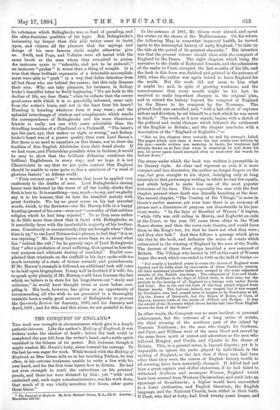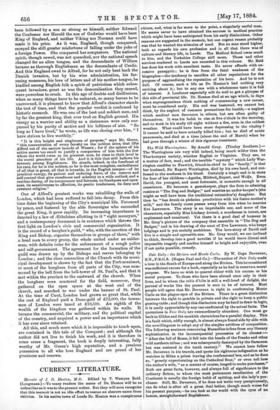THE CONQUEST OF ENGLAND.* Tins work was wrought in circumstances
which give it a deeply pathetic interest. Like the author's Making of England, it was written under the shadow of death ; before the task could be completed the pen fell from the writer's hand, and a noble spirit vanished in the fulness of its power. But sickness, though it might weaken Mr. Green's body, never lowered his courage. To the last he was eager for work. While busied with the Making of England, as Mrs. Green tells us in her touching Preface, he was often, in his extreme weakness, unable to write a line with his own hand, and for the first time learnt how to dictate. He had not even strength to mark the corrections on his printers' proofs, and those too were dictated by him ; yet "with such sustained zeal, such eager conscientiousness, was his work done, that much of it was wholly rewritten five times, other parts three times."
• The Conquest of England. By Joni Biebard Green, MA., LL.D. London : Macmillan and Co.
In the autumn of 1%1, Mr. Green went abroad, and spent the winter on the shores of the Mediterranean. On his return the following May, in somewhat improved health, he turned again to the interrupted history of early England, "to take up the tale at the period of its greatest obscurity." His intention was that the present volume should close with the conquest of
England by the Danes. The eight chapters which bring the narrative to the death of Eadmund Ironside, and the submission
of the realm to Cnut, occupied the last months of his life, and the book in this form was finished and printed in the autumn of
1 2, when the author was again forced to leave England for the south. But the work did not seem to him what it might be; and, in spite of growing weakness, and the consciousness that every month might be his last, he resolved to make important changes in the original plan, and to extend the history beyond the conquest of England by the Danes to its conquest by the Normans. The printed book was cancelled, and, "with a last effort of supreme
ardour and devotion, he set himself to a task which he was never to finish." The work, as it now stands, begins with a sketch of the political and social changes which followed the settlement
of the English in Britain ; and the chapter concludes with a description of the "England of Ecgberht :" —
"But as the chapter drew towards its end his strength failed. The pages which now close it were the last words ever written by his pen—words written one morning in haste, for weakness had already drawn on so fast, that when in weariness he laid down his pen, he never again found strength even to read over the words he had set down."
The stress under which the book was written is perceptible in its literary style. As clear and vigorous as ever, it is more compact and less discursive, the author no longer lingers on the way, but goes straight to his object, indulging only at long intervals in that picturesque writing in which he had few equals, and which helped to make him one of the most popular historians of his time. This is especially the case with the first chapter, penned when death was literally knocking at the door.
The second chapter, "The Coming of the Vikings," is more in Green's earlier manner, yet even here there is an economy of phrase and a directness of purpose not discoverable in his pre- vious works. "In the days of Beorthid of Wessex," it begins, "while Offa was still ruling in Mercia, and Ecgberht an exile
at the Court, in the year 787 came three ships to the West
Saxon shores, and then the reeve rode thereto, and would force them to the King's tun, for that he knew not what they were; and they slew folk." And then follows a passage which gives the clue to the book, and indicates the series of events which culminated in the winning of England by the men of the North.
The descent of those three ships heralded a new conquest of Britain. The Vikings who landed in 787 on the coast of Wessex began the work which was ended in 1066 on the field of Senlac :—
"For nearly a hundred years to come the shores of England were harried and its folks slain by successors of those Northern pirates, till their scattered plunder raids were merged in the more organised attacks of the Danish sea-kings. The conquests of Ivar and Guth.. run and Balfdene in the days of Alfred were, in their turn, but the prelude to the bowing of all England to a foreign rule under Swein and Cnut. But in the end the fruit of the long attack slipped from Daniell hands. The harvest, indeed, was reaped, but it was reaped by Northmen who had ceased even in tongue to be Northmen at all. Not the Danes of Denmark, but the Danes of Rouen, of Caen, of Bayeux, became lords of the realm of Alfred and Eadgar. It was the sword of the Normans which drove for the last time from English shores the fleet of the Danes."
In other words, the Conquest was no mere incident or personal
achievement, but the outcome of a long series of events, the third winning of the southern part of the island by Teutonic Northmen ; for the men who fought for Guthrun, and Clint, and William were of the same blood and moved by the same fierce spirit of unrest and adventure as the men who followed Hengist, and Cerdic, and Cymric to the shores of Britain. This, in a general sense, is beyond dispute ; yet it is impossible to ignore the parts played by individuals in the making of England, or the fact that if three men had been other than they were, the course of English history would, to all seeming, have been materially changed. If Alfred had not been a great captain and skilful statesman, if be had failed to withstand Guthrun and reconquer Wessex, England would have been severed from Western Christendom, and sunk into an
appanage of Scandinavia ; a higher would have succumbed to a lower civilisation, and English literature, the English language, and the National Church, been stifled in their birth.
If Cnut, who died at forty, had lived twenty years longer, and
been followed by a son as strong as himself, neither Edward the Confessor nor Harold the son of Godwine would have been King of England, and neither Viking nor Norman could have made it his prize. As it was, England, though conquered, escaped the still greater misfortune of falling under the yoke of a foreign Power. She conquered her conquerors. The national spirit, though cowed, was not quenched, nor the national speech changed for an alien tongue, and the descendants of William became as thorough Englishmen as the descendants of Cerdic. And this England owed to Alfred, for he not only beat back the Danish invasion, but by his wise administration, his far- seeing measures, his love of letters and of his mother-tongue, he kindled among English folk a spirit of patriotism which subse- quent invasions, great as was the demoralisation they caused, were powerless to crush. In this age of doubts and disillusions, when so many things have to be unlearnt, so many heroes to be uncrowned, it is pleasant to know that Alfred's character stands the test of time, and that the popular verdict is confirmed by historic research. He was one of the best and noblest men, and by far the greatest king, that ever trod on English ground. His energy as a warrior and ability as a statesman were only sur- passed by his purity of motive and his loftiness of aim. "So long as I have lived," he wrote, as life was closing over him, "I have striven to live worthily."
"It is this height and singleness of purpose," says Mr. Green, "this concentration of every faculty on the noblest aims, that lifts Alfred out of the narrow bounds of Wessex ; for if the sphere of his action seems too small to justify a comparison of him with the few whom the world owns as its greatest men, he rises to their level in the moral grandeur of his life. And it is this that still hallows his memory among Englishmen. He stands, indeed, in the forefront of his race, for he is the noblest, as he is the most complete, embodiment of all that is great, all that is loveable, in the English temper—of its practical energy, its patient and enduring force, of the reserve and self-control that give steadiness and sobriety to a wide outlook and a restless daring, of its temperance and fairness, its frankpess and open- ness, its sensitiveness to affection, its poetic tenderness, its deep and reverent religion."
One of Alfred's greatest works was rebuilding the walls of London, which had been suffered to fall into decay. From this time dates the beginning of the City's municipal life. Favoured by peace, and fostered by the able Sovereigns who succeeded the great King, it grew rapidly. Its increasing importance is denoted by a law of iEthelstan allotting to it" eight moneyers," and a contemporary document is in existence which throws the first light on London's civic and commercial organisation. It is the record of a burgher's guild," who, with the sanction of the King and Bishop, organise themselves in groups of three," with a head man to every group, the whole united under an ealder- man, with definite rules for the enforcement of a rough police and self-government. The agreement for the formation of the guild was drawn up by the Bishops and reeves belonging to London ; and the close connection of the Church with its muni- cipal development is shown by the fact that the Port-munimot, or moot of the burghers, from all parts of the City, was sum- moned by the bell from the bell-tower of St. Paul's, and that it met within the precinct to the eastward of the church. When the burghers were mustered for the field, moreover, they gathered on the open space at the west end of the church, and marched to war under the banner of St. Paul. At the time of Cnut, London had grown so great that, while the rest of England paid a Dane-geld of £72,000, the towns- men of London were taxed at £10,500. An eighth of the wealth of the kingdom was gathered within its walls. It became the commercial, the military, and the political capital of the country, and acquired a power and an importance which it has ever since retained.
All this, and much more which it is impossible to touch upon, are contained in this tale of the Conquest ; and although the author did not live to finish his work, and it is therefore in some sense a fragment, the book is deeply interesting, fully worthy of Mr. Green's high reputation, and a precious possession to all who love England and are proud of her greatness and renown.



































 Previous page
Previous page